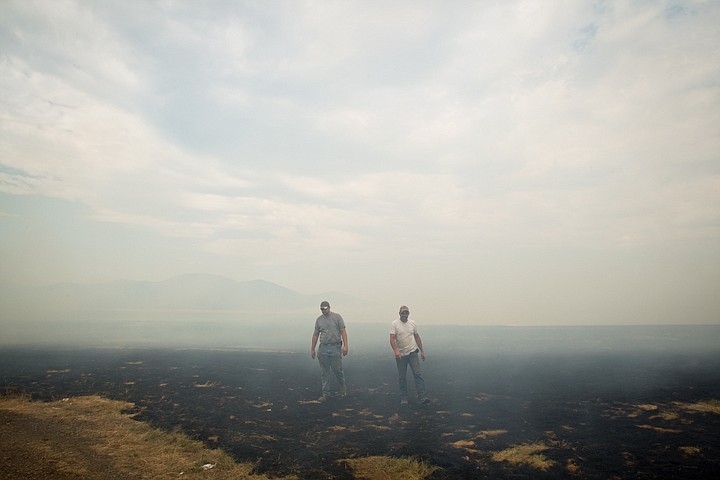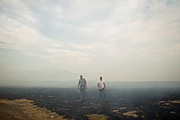Prairie burning begins
Alecia Warren | Hagadone News Network | UPDATED 15 years, 5 months AGO
COEUR d'ALENE - White smoke blended with blue sky above the Rathdrum Prairie on Wednesday afternoon as farmers started field burning for the first time this summer.
Lance Deacon with Meyer Farms was optimistic as he watched smoke drift off the blackened bluegrass fields off Wyoming Avenue.
"This is earlier than it was last year," Deacon said. "We have a little more of a head start."
Wind conditions allowed for the company to burn roughly 150 acres of the targeted 300 on Wednesday. Deacon said the landowners would fertilize and water the ground soon after the flames were gone.
Hopefully, burning will do the intended job and produce a better yield next harvest, he added.
"We won't know for sure until next year's crop. It depends on what Mother Nature throws in afterward," he said with a chuckle.
The timing of field burning makes a noticeable difference in the output of the fields, Deacon said.
Last year's late burning, for example, resulted in a disappointing bounty, he said.
"Last year, we started a little more toward when school was in. It really put us on the edge," he remembered. "We felt it this year. Yields were down quite a bit."
About 430 acres on the prairie remain to be burned this summer, said Mark Boyle, regional air quality manager for the Idaho Department of Environmental Quality Coeur d'Alene office.
Farmers can only burn during specific field and wind conditions, Boyle said.
"The whole program is designed to protect air quality," he said. "Because of the sensitive populations surrounding the fields now, it really restricts the number of days burning can occur out there anymore."
Farmers have proven flexible with calling off burns if wind speed and direction aren't ideal, he added.
"They work real close with us," Boyle said. "When we give them the go ahead, they're more than anxious to get a fire started. And when we call and tell them, 'It's not going as optimally as we like, so shut it down,' they respond immediately."
Deacon pointed out that there were several water trucks at Wednesday's site, in case any flames got out of hand. Traffic guards were directing cars through the area.
"We try to take precautions for the safety of ourselves and the public," he said.
ARTICLES BY ALECIA WARREN
Tribe's property taxes canceled
After a meeting with Coeur d'Alene Tribe officials today, Kootenai County commissioners voted unanimously to cancel all property taxes on reservation land from the past four years.
In hot water
Idaho DEQ says temps are too warm for trout
We like our fish cooked... But not before we catch them.
Past issues
Old charge blocks weapons permit
A Hayden resident believes his rights were violated when he was disqualified from obtaining a concealed weapons permit because of a felony charge from over 40 years ago.



